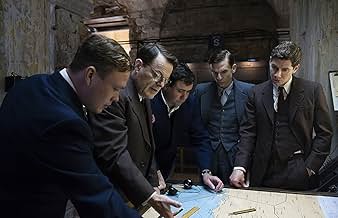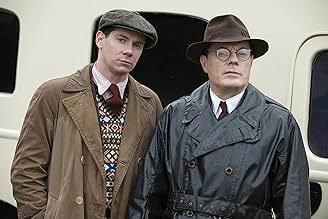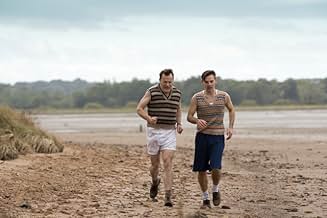IMDb RATING
6.8/10
1.3K
YOUR RATING
Eddie Izzard stars in this funny, moving and inspiring factual drama about the pioneering work on radar by a little known team of scientists in the run up to the Second World War.Eddie Izzard stars in this funny, moving and inspiring factual drama about the pioneering work on radar by a little known team of scientists in the run up to the Second World War.Eddie Izzard stars in this funny, moving and inspiring factual drama about the pioneering work on radar by a little known team of scientists in the run up to the Second World War.
- Awards
- 2 nominations total
Neal Stewart-Roxburgh
- The 7th Boffin
- (uncredited)
- Director
- Writer
- All cast & crew
- Production, box office & more at IMDbPro
Featured reviews
With war against Germany approaching, the British government sends out a request for a death ray. Robert Watson Watt (Eddie Izzard) suggests something else, radar. Instead of the stuffy professors from the highest universities, he recruits other weathermen. The program faces opposition from his superior Lindemann with Churchill calling it building castles in the sky.
Not every story can be dramatized and this movie tries its hardest. The small guy against the world is always a good angle. All of that works very well. The technical aspect of radar is explained but the drama isn't that dramatic. I'm reminded of squeezing an orange to explain the nuclear bomb. His married life is probably the least appealing. It diminishes his wife. It's almost more compelling to have her fade into the background which would justify her leaving. As for the acting, these are experienced veterans. Eddie Izzard is solid. Tim McInnerny is playing Churchill which I wouldn't be able to guess. He's a little skinny for the role. Overall, it tries hard to be dramatic and works well enough.
Not every story can be dramatized and this movie tries its hardest. The small guy against the world is always a good angle. All of that works very well. The technical aspect of radar is explained but the drama isn't that dramatic. I'm reminded of squeezing an orange to explain the nuclear bomb. His married life is probably the least appealing. It diminishes his wife. It's almost more compelling to have her fade into the background which would justify her leaving. As for the acting, these are experienced veterans. Eddie Izzard is solid. Tim McInnerny is playing Churchill which I wouldn't be able to guess. He's a little skinny for the role. Overall, it tries hard to be dramatic and works well enough.
It is the mid-1930s and Germany is making radical advances in weaponry, especially aircraft. Suspecting that a war with Germany is likely, the British War Ministry look to new and advanced inventions of their own. After aiming for something more radical - a death ray - they end up with the invention that saved Britain during its darkest hour - radar. This is the story of the invention of radar, and, in particular, the story of Robert Watson Watt, its inventor. We see his trials and tribulations of its invention, and the characters that were trying to undermine his project.
A decent history-drama. Gives a good sense of the work, trial and error and set backs involved in the invention of radar. We also see how close the project came to being shelved, and the impact it had on WW2, especially the Battle of Britain.
Solid performance by Eddie Izzard as Robert Watson Watt. I couldn't imagine him as a dramatic actor before this, as he is more a comedy actor and stand-up comedian (and a very good one). However, he proves very much up to the task.
Well worth watching, especially if you're a history buff.
A decent history-drama. Gives a good sense of the work, trial and error and set backs involved in the invention of radar. We also see how close the project came to being shelved, and the impact it had on WW2, especially the Battle of Britain.
Solid performance by Eddie Izzard as Robert Watson Watt. I couldn't imagine him as a dramatic actor before this, as he is more a comedy actor and stand-up comedian (and a very good one). However, he proves very much up to the task.
Well worth watching, especially if you're a history buff.
I guess I enjoyed this film because of its theme - RADAR - rather than the cinematic dimensions. I worked in the BBC's engineering department many years ago and could identify the challenges of inventing something new with limited resources.
Having said that I thought Eddie Izzard did a really good job despite other people's criticism or his wobbly accent. His acting was believable and carried the passion that Robert Watson-Watt must have had to press through to an operational system. I liked the themes of teamwork, toxic relationships, camaraderie, not giving up, working to deadlines.
As another reviewer mentioned, there was good use of symbolism if you were open to see it. The weakest part for me was the relationship between Robert and his wife played by Laura Fraser. Seeing her again made me want to watch the wonderful 'A Knight's Tale' with Heath Ledger.
I guess the technology challenges added to the score for this. If you like that kind of thing this is a good film to watch.
Having said that I thought Eddie Izzard did a really good job despite other people's criticism or his wobbly accent. His acting was believable and carried the passion that Robert Watson-Watt must have had to press through to an operational system. I liked the themes of teamwork, toxic relationships, camaraderie, not giving up, working to deadlines.
As another reviewer mentioned, there was good use of symbolism if you were open to see it. The weakest part for me was the relationship between Robert and his wife played by Laura Fraser. Seeing her again made me want to watch the wonderful 'A Knight's Tale' with Heath Ledger.
I guess the technology challenges added to the score for this. If you like that kind of thing this is a good film to watch.
What could have been a fascinating tale turns out, regrettably, to be a pile of slush. Fine cast can't overcome a weak script by the brilliant historian Ian Kershaw. Not only does he fail to create rounded believable characters, but he is unable to capture a substantive explanation for how the men are developing their theories. All reduced to blackboard scribbles. It's not an easy thing to present complex science to a credible plot for lay viewers, but Kershaw's version collapses into the simplistic and flat. It just leaves the film empty. If you want to see a great film on a war-time pressure cooker for inventors try The Dam Busters (1955), directed by Michael Anderson. Another absolutely brilliant one about scientific war time geeks is The Small Back Room (1948) by the startling, inventive and fun duo Michael Powell and Emeric Pressburger. They nail all the quirky Britishisms and get the romance right too. Kershaw might've taken a few tips from these tremendous scripts and films.
In 5 years, this is only the second review that I have done on IMDb. The reason for this review is that there were only 4 other user reviews and this movie deserves much more so here I am writing a review. I started off watching by myself and a few minutes into the movie my son joined me. My son is an action movie buff and will usually leave the room if it isn't action so I was surprised to find him still there at the end of 'Castles In the Sky'. Not only was he still there, he initiated a discussion about the movie with respect to his new-found know knowledge of just how important radar was in helping Britain win the second world war. This movie was also very inspiring since Robert Watts developed radar in the face of adversity and very much to his credit, he was able to overcome many obstacles while under immense pressure. I know that myself and my son left this movie with a 'can- do' attitude. The acting was superb and even though it was a dark time for England, there was some light-hearted scenes which were thoroughly enjoyed by both of us. I can absolutely state that this movie is a good movie that I would highly recommend to others.
Did you know
- GoofsThe aircraft in the initial test is of the right era but the wrong type - it looks like a de Havilland Rapide, while it should be a Handley Page Heyford, something in which the film makers had little choice, since not a single example of a Heyford survives, flying or not.
- ConnectionsReferenced in Six Minutes to Midnight: Behind the Scenes (2020)
Details
- Runtime
- 1h 30m(90 min)
- Color
Contribute to this page
Suggest an edit or add missing content


































